Peking University, November 11, 2022: "Quantifighter, R U Ready?" (QRUR) is a group-study centered practicum set up in the PKU Analytics Lab to assess global political risks. Students from all disciplines with a desire to advance their social science knowledge and data-analysis abilities have been encouraged to take part in this practicum.
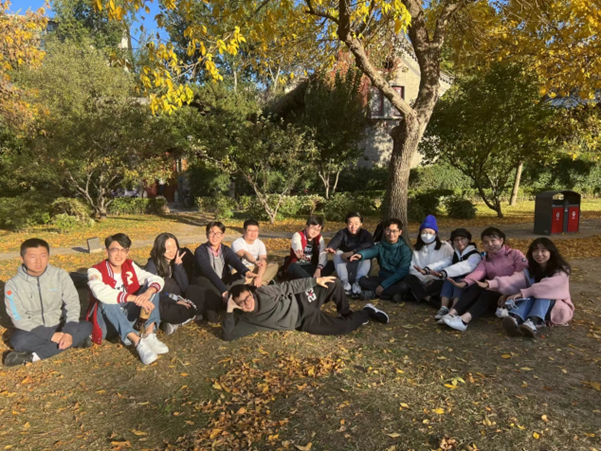
Group photo of the Quantifighters
The learning process of QRUR has been divided into three progressive phases. In the first phase, students mastered the analytical processing of data in the context of social sciences, which included R language and many more analytical tools that were covered in group study and discussions. In the second phase, students would decide on their research topics according to their interests. Under the guidance of faculty members, students would collect and analyze relevant data that would help them answer their research questions. In the third phase, the main goal was to solidify the knowledge and skills learned in the previous steps as a foundation, and proceed to learn how to write a publishable research paper, present research in a standard format and draw opinions in a laboratory-organized dissertation workshop.
The initiator and convener of the inaugural QRUR is Huang Yuming, a PKU School of International Studies Class of 2024 graduate student. Under Yuming’s leadership, the inaugural batch of Quantifighters have been studying in groups for two months and have completed four chapters of the self-study materials. As the first batch of students participating in QRUR, they have exemplified independence, creativity, self-discipline and collaborative team spirit.
Since the establishment of the PKU Analytics Lab for Global Political Risks in September 2022, many students that were involved were curious as to what kind of learning resources and organizations the lab had in store for them. Thus, they took the initiative to contact the lab professors first and learned that the lab strived to create a learning atmosphere that aimed to stimulate learning in unconventional ways.
In contrast to learning during lectures, research-based learning required hands-on practices where students were required to utilize the suitable methods and tools and apply them to the problem at hand. Since the practicum was open to students from all disciplines, each students’ interdisciplinary backgrounds provided valuable insight in this platform that was based on collective learning. Approximately 10 peers from the various faculties who were all interested in quantitative and qualitative analytical methodologies came together and established the QRUR. They convened with the same academic interests in mind, learned from each other and discovered new intriguing research fields. Inspired by this, they called themselves the "Quantifighters".
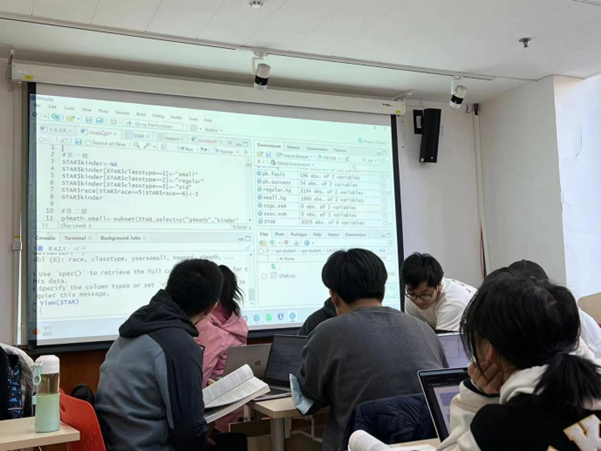
Students engaging in group discussions
Group Vision
A. Centering on Self-Learning and Self-Teaching
By allowing students to take the initiative in the classroom, students' overall abilities in analytical data processing in social sciences, as well as relevant evaluation skills are first challenged then assisted by faculty members. By having roles reversed in the classroom, students were able take the initiative in their own learning and grasp the material faster.
B. Unhindered Communication between Respective Fields
Via the platform, students from various faculties and departments were gathered to exchange and hold discussions in regular gatherings, which allowed them to make full use of the resources provided at PKU, thereby expanding their horizons of the social sciences.
C. Problem-Based Learning with Tools as a Supplement
Through the study of quantitative and qualitative tools and methods, students would understand how to ask questions, ways of problem-solving and methods of analyzing problems in-depth, so as to achieve the ultimate goal of reaching a sufficient conclusion.
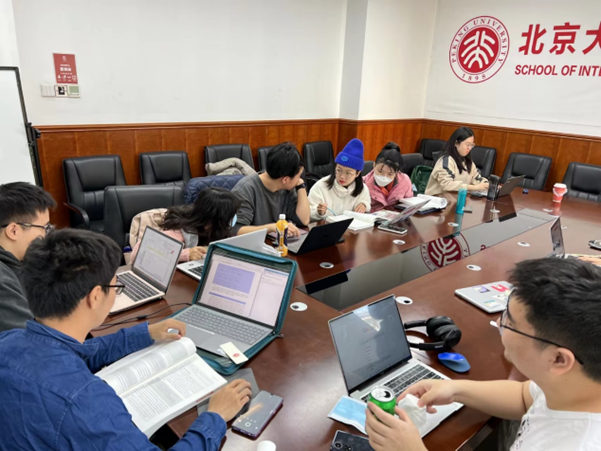
Exchanging views within the group
Learning Targets
Short-term goal: With the resources of the lab, students who were interested in quantitative and qualitative data processing but with no foundations would be provided with a spontaneous learning and communication platform, supplemented by regular Q&A discussions by lab faculty.
Mid-term goal: While mastering the tools, there would also be a focus on cultivating quantitative and qualitative thinking and simultaneously enhance problem awareness through communication.
Long-term goal: Students would eventually be grouped according to their respective interdisciplinary interests. By sharing common research interests, they would analyse issues from a multidisciplinary perspective, and use relevant tools and frameworks they have acquired in earlier stages.
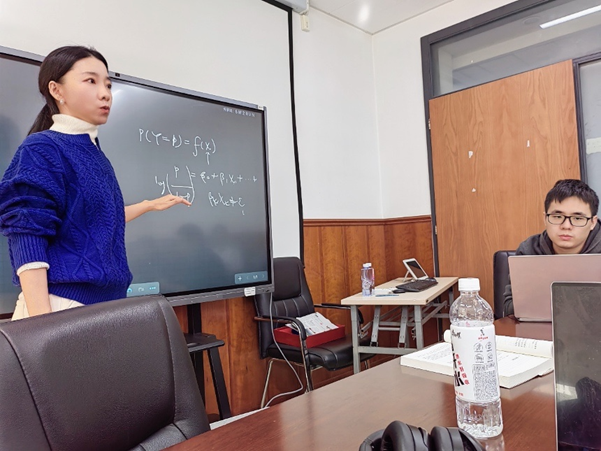
Professor Pang Xun
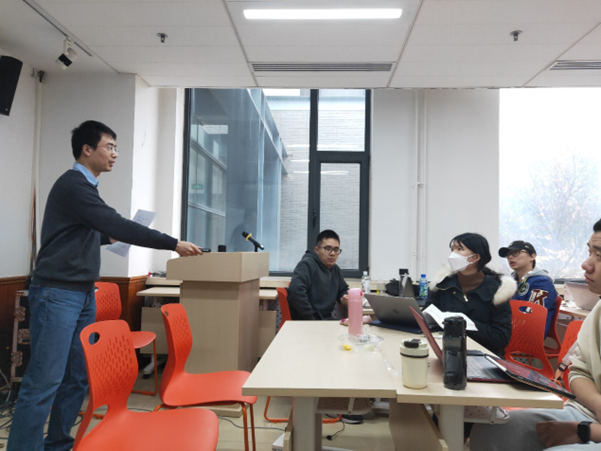
Professor Lu Xiao
Operating Mechanism
Currently, the group is still in its early stages. So far, the self-learning materials used is based on “Quantitative Social Science”, edited by Harvard Professor Kosuke Imai. Students are required to independently read the materials, summarize key points and bring their questions to the regular Sunday discussions.
Since quantitative and qualitative analysis emphasized the need for practicums and problem-based orientations, when learning via " Quantitative Social Science",students were asked to take notes during gatherings, and complete followed-up exercises after each seminar.
At the end of each chapter, the professors would answer any questions the Quantifighters may have, and chime in their thought-provoking opinions.
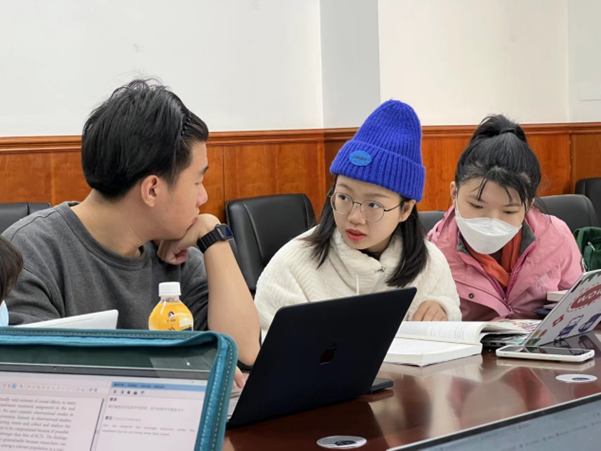
Quantifighters engaging in in-depth discussions
Afterwords from the “Quantifighters”
“Different from other practicums that require background knowledge, students who participate can actually begin from the basics, and gradually pick up the pace by attending spontaneous weekly learning seminars and exchanges. The difference lies not in the mere distance between us, but the vastly great span of different ideas that have sprung from our minds."
—— Yu Jie (School of International Studies)
“I was able to learn from my peers as we collaboratively worked through problems and concepts that were hard to understand. I am excited to be able to apply this newfound knowledge in my future research.”
—— Jeeseon (Yenching Academy)
Written by: Vissly Chan
Edited by: Rose Li
Source: PKU News (
Chinese)





